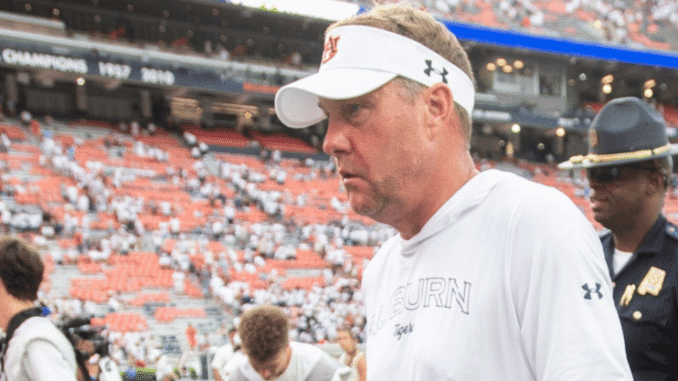
Hugh Freeze Reveals How House Settlement is Reshaping Auburn Football and Supercharging Recruitment Efforts…Read More…
In the ever-evolving landscape of college football, few developments have sent shockwaves through the sport quite like the House v. NCAA settlement. For Auburn head coach Hugh Freeze, the repercussions have been immediate, transformative, and—potentially—game-changing.
Speaking candidly in a recent media session, Freeze shed light on how the landmark legal settlement has impacted Auburn’s program, particularly when it comes to recruiting the next generation of Tigers. While many programs are still adjusting to the new norms introduced by the House settlement, Freeze believes Auburn is positioning itself to not only adapt—but thrive.
A New Era for College Football
The House settlement, which effectively resolves several long-standing legal challenges against the NCAA related to name, image, and likeness (NIL) compensation, has ushered in a new age. As part of the resolution, schools are now allowed to share a significant portion of revenue directly with student-athletes—creating, for the first time, a quasi-professional compensation model in college sports.
“It changes everything,” Freeze said. “We’re no longer operating in a gray area. Players now know what they’re entitled to, and we as a staff have to be clear and transparent in what Auburn can offer—not just in terms of development and exposure, but actual financial support.”
Auburn’s Preparedness Pays Off
According to Freeze, Auburn had already begun laying the groundwork for such a reality long before the settlement was finalized.
“I give a ton of credit to our administration,” he noted. “They saw where the game was heading and started planning accordingly. From creating NIL collectives to partnering with local and national businesses, we’ve built a framework that’s attractive to recruits and sustainable for the program.”
One of the most notable changes has been the establishment of a dedicated NIL operations team within the athletic department. This group handles everything from player education to legal compliance to brand partnerships, ensuring that athletes are supported and informed from day one.
Impact on Recruitment
For Freeze and his staff, the biggest impact has been on the recruiting trail. “It used to be that you’d walk into a living room and talk about tradition, facilities, championships,” he explained. “Now, that’s still part of the conversation—but there’s a real expectation from families and players to understand how the school will help them build their personal brand and earn money while playing.”
He added, “We’re now competing in a market where kids are making six figures before they take a snap. That’s not hype anymore—it’s reality.”
And Freeze believes Auburn is up to the challenge. “What we offer here isn’t just a dollar amount. We’ve created an ecosystem where a player’s talent, hard work, and personality can flourish—on the field and in the marketplace.”
A Shift in Recruiting Philosophy
The settlement has also prompted a shift in how Auburn evaluates prospects. It’s no longer just about 40-yard dash times or highlight reels—it’s about marketability, leadership, and long-term vision.
“We’re paying more attention to how a player carries himself off the field,” Freeze admitted. “Social media presence, community engagement, how they handle interviews—these are becoming factors in recruitment.”
This, he said, doesn’t mean the sport has lost its soul. “At the end of the day, you still need to block, tackle, throw, catch, and win. But now, those who can combine athletic excellence with off-field maturity are rising to the top of our board.”
Managing the Locker Room
Of course, with the influx of compensation comes the risk of locker room tension. Freeze is well aware of the challenge.
“You’ve got to be proactive. Transparency is key. We’re making sure our players understand how the system works and why some guys might earn more than others,” he said. “It’s just like the NFL. Different players bring different value—it’s about performance, personality, and position.”
He added that Auburn’s culture will be the ultimate stabilizer. “We preach selflessness and team above all. If we stay grounded in those values, the money won’t become a distraction—it’ll become a motivator.”
Looking Ahead
For Freeze, the future of college football may be more complex, but it’s also more exciting than ever.
“We’re stepping into a new age of athlete empowerment,” he said. “I’m proud that Auburn isn’t running from that—we’re embracing it.”
He also emphasized that while the House settlement may level the playing field in some ways, it also raises the stakes. “Programs that can’t adapt will fall behind quickly. But those that can evolve—those that see this as an opportunity—will come out ahead.”
And when it comes to Auburn, Freeze is optimistic. “We’re building something special here. The House settlement just gave us a bigger stage to prove it.”
Fan and Alumni Response
The response from the Auburn faithful has been largely supportive. Boosters and alumni have stepped up their involvement, and the school’s NIL collective, “WarEagle United,” has reported record donations since the settlement’s announcement.
“It’s a new way of showing your love for the program,” said former Auburn player and current booster Marcus McNeill. “You’re not just helping a school win—you’re helping young men change their lives.”
Final Thoughts
As the NCAA landscape continues to evolve, Auburn and Hugh Freeze appear ready to lead the way. By leaning into the new realities of athlete compensation, Freeze is not only reshaping Auburn’s recruiting philosophy—he’s helping redefine what it means to run a top-tier college football program.
The Tigers may still be chasing championships on the field, but off the field, Auburn is already winning.
Leave a Reply